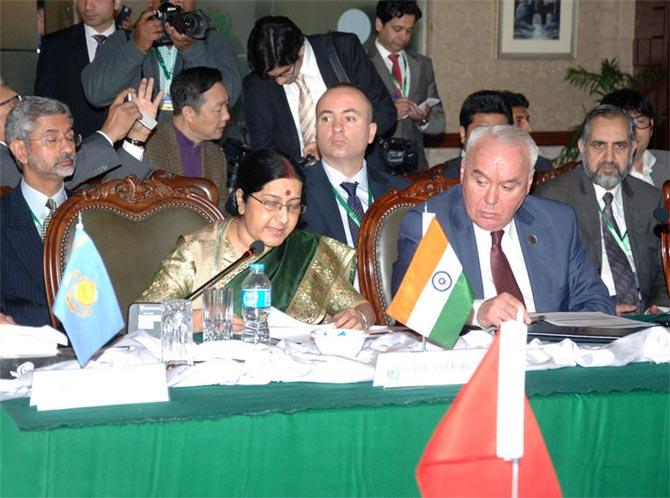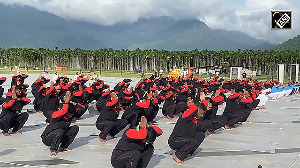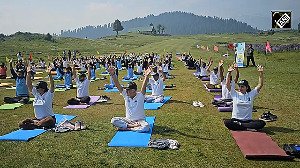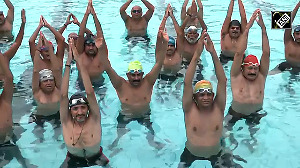'The truly amazing part is the influence that Washington wields over Modi and the Sangh Parivar,' says Ambassador M K Bhadrakumar.
'What explains it? The Americans know precisely well which raw nerve to touch and how to make the Sangh Parivar, Modi and this government perform the trapeze act.'
 External Affairs Minister Sushma Swaraj stands today as the tallest minister of her government -- at least an inch taller than Prime Minister Narendra Modi himself. One almost wishes they had a role reversal. The elan with which she carried out the mission to Pakistan takes the breath away.
External Affairs Minister Sushma Swaraj stands today as the tallest minister of her government -- at least an inch taller than Prime Minister Narendra Modi himself. One almost wishes they had a role reversal. The elan with which she carried out the mission to Pakistan takes the breath away.
The mission handed down to her by Modi was an extremely tricky one, not only because it demanded that Swaraj put on a brave face and with dignity and composure backtracked on just about everything that she had so forcefully articulated only recently in regard of India-Pakistan talks, but also because she would know that Modi only knows ultimately what is on his mind, and he is yet to break his mauna vrat since the historic 167-second chat with his Pakistani counterpart Nawaz Sharif in Paris -- and Modi is an inscrutable man.
How Swaraj bravely defends her mission to Pakistan in Parliament, giving some rationale to Modi's flip-flop on Pakistan, will be a great moment to watch. Modi should have assumed that responsibility himself.
Meanwhile, the gravity of what has happened is yet to sink in. Simply put, it is stunning: Modi has picked up the threads from where Manmohan Singh abandoned them in great disappointment after the then Opposition, Modi's party, waylaid him at every step.
As the joint statement issued in Islamabad testifies, Modi, in fact, went one step further -- it is no longer 'composite' dialogue, it will be 'comprehensive'dialogue.
Imagine what would have been the state of play today in India-Pakistan relations if the Bharatiya Janata Party had allowed Manmohan Singh to advance the 'biriyani diplomacy' of the UPA government, to borrow Swaraj's own expression, to its logical conclusion. To be sure, we all would have been living in a far better, more secure region today.
Therefore, it is some natural justice no doubt that the BJP is being forced to eat its own vomit -- and, the mother of all ironies is that Modi is the master of ceremonies when the BJP does that.
All this should make the BJP introspect what colossal damage its vacuous, combative, divisive politics has done to national interests. And yet, they are still at it, as the National Herald controversy underscores.
How Modi cracks the whip at his starry-eyed bhakts and make them lump the Comprehensive Bilateral Dialogue with Pakistan remains to be seen. The high probability is that he will silence them, because the mentors of the government, the Sangh Parivar, would have okayed this U-turn in Pakistan policy. But then, the cadres who are genuinely sold out on Hindu Rashtra and Akhand Bharat are sure to feel let down.
The truly amazing part is the influence that Washington wields over Modi and the Sangh Parivar. What explains it? Suffice it to say, the Americans know precisely well which raw nerve to touch and how to make the Sangh Parivar, Modi and this government perform the trapeze act.
The heart of the matter is that the US wants the India-Pakistan tensions to be brought down; or else, it fears that its regional strategies may run into headwinds.
Pakistan has drawn the bottom line that its cooperation is absolutely conditional on the US' ability to force India to lower tensions on the border and become a predictable neighbour.
The Obama administration has appreciated this. The joint statement issued after Nawaz Sharif's visit to the White House in October covered the range of Pakistani concerns, including over the alleged state-sponsored terrorism by India, and, of course, the Kashmir problem.
The real danger lies here. Since this U-turn by Modi lacks authenticity, there is the high risk that the Indian establishment will merely go through the motions of the Comprehensive Bilateral Dialogue. India's best hope is that such a pantomime also suits Sharif. But that may or may not be the case. Time will tell.
However, make no mistake, there is a Pakistani dossier in three volumes, reportedly containing hard evidence regarding alleged Indian support to terrorist groups, which is lying in the vaults of the US administration, and the CIA and the National Security Council would have briefed Obama about it before he met Modi in Paris.
Therefore, we can only draw comfort that Pakistan has been appeased for the present. For, Pakistan knows that there are 'do-able' issues in India-Pakistan relations such as Siachen or Sir Creek disputes and it will apply the litmus test at some point soon enough to see how far Modi has had a genuine change of heart, or whether he is still a prisoner of his past.
The point is, in the Pakistani perspective, Modi is the problem -- and the solution. The widespread belief in Pakistan is that Modi, the BJP and the Sangh Parivar would have continued use for India-Pakistan tensions to advance their agenda in Indian electoral politics or to distract attention from the failings of the government.
Manmohan Singh didn't have this credibility problem. The Pakistani side never doubted his sincerity of purpose -- or his intellectuality.
- Better ties with Pak depends on this Sharif, not the other one
- The burden of expectation on Mrs Swaraj
- Why Modi government engaged Pakistan in secrecy
- For the first time after Kargil, India has the better of Pakistan
IMAGE: External Affairs Minister Sushma Swaraj at the Heart of Asia conference in Islamabad, December 9, hours before India and Pakistan announced a resumption of dialogue. Photograph: MEA











